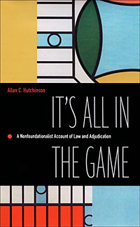
A major statement from one of the foremost legal theorists of our day, this book offers a penetrating look into the political nature of legal, and especially judicial, decision making. It is also the first sustained attempt to integrate the American approach to law, an uneasy balance of deep commitment and intense skepticism, with the Continental tradition in social theory, philosophy, and psychology.
At the center of this work is the question of how politics affects judicial activity-and how, in turn, lawmaking by judges affects American politics. Duncan Kennedy considers opposing views about whether law is political in character and, if so, how. He puts forward an original, distinctive, and remarkably lucid theory of adjudication that includes accounts of both judicial rhetoric and the experience of judging. With an eye to the current state of theory, legal or otherwise, he also includes a provocative discussion of postmodernism.
Ultimately concerned with the practical consequences of ideas about the law, A Critique of Adjudication explores the aspects and implications of adjudication as few books have in this century. As a comprehensive and powerfully argued statement of a critical position in modern American legal thought, it will be essential to any balanced picture of the legal, political, and cultural life of our nation.

Taking on leading contemporary theories to explore the claim that “law is politics,” Hutchinson delineates a route toward professional, relevant, and responsible—if radical—judicial practices. After discussing the difference between foundationalist, antifoundationalist, and nonfoundationalist legal critiques, he offers a focused, unequivocal, and positive account of the advantages of operating within a nonfoundationalist framework. Although such an approach centralizes the role of rhetoric in law, Hutchinson claims that this does not necessitate a turn away from politics or, more particularly, from a progressive politics. Driving home the political and jurisprudential impact of his critique and of his account of nonfoundationalist alternatives, he urges judges and jurists to engage in law’s language game of politics.
This engaging book will interest linguistic philosophers, legal theorists, law students, attorneys, judges, and jurists of all stripes.
READERS
Browse our collection.
PUBLISHERS
See BiblioVault's publisher services.
STUDENT SERVICES
Files for college accessibility offices.
UChicago Accessibility Resources
home | accessibility | search | about | contact us
BiblioVault ® 2001 - 2025
The University of Chicago Press









